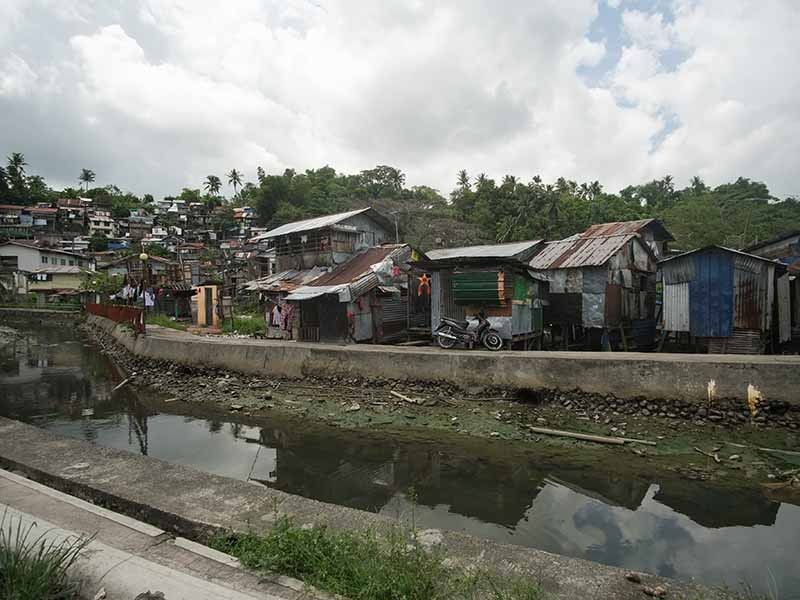Powering Tacloban's poor: Making renewable energy relatable and within reach

Part 2 of a two-part feature.
Part 1: 'Yolanda' survivors juggle safety and need for livelihood, services
TACLOBAN CITY, Philippines — A question is asked in Filipino: "Have you heard about climate change or the climate crisis?"
A woman asks her teenage daughter to help her answer the question. Another woman says it has to do with typhoons. Another says it caused by people throwing garbage in the ocean.
These women survived Supertyphoon Yolanda (Haiyan), one of the deadliest indicators of climate change most caused by countries in the Global North. However, women from the Global South, despite being the most vulnerable to the climate crisis, are often excluded from discussions and negotiations to address it.
"Middle-class citizens have an idea, for example, when we speak about Renewable Energy (RE), and while the basic masses understand typhoon and drought, the gap is on relating it to the bigger issue of the climate crisis," said Xian Guevarra, national coordinator of Youth Advocates for Climate Action Philippines (YACAP).
READ: Climate-vulnerable island nations call on world to save 'our very future'
Making the climate crisis and renewable energy 'relatable'
A small solar panel is being used in Pope Francis Village, a relocation site in Tacloban. Because of partnerships among NGOs to grassroots organizations, most residents in the area know about solar power as an alternative energy source.
For the Institute for Climate and Sustainable Cities, it is undeniable that the shift to clean energy is urgent and necessary to avoid deadly typhoons such as Yolanda in the future.
The international non-government group advocates low-carbon, climate-friendly development and is doing this by introducing TekPaks, portable solar-powered generators to energy-poor communities across the country.
Under their "Solar Scholars" program, grassroots communities are educated to provide solar power to emergency first-responders during disasters.
However, urban poor residents like Marilyn Delingon say that the technology remains inaccessible, especially for a fisherman's wife who earns P1,200 a month at most and cannot afford to save money to invest in panels.
Guevarra said that, in YACAP, what they do to make the issue of the climate crisis and Just Energy Transition more relatable to the marginalized is to tie it to issues close to their stomachs, as these are their primary issues.
"For farmers, since their immediate problem is landlessness, we connected the climate crisis to land conversion. Together, we studied that if their land will be taken away from them, nothing would absorb rainwater anymore because everything else has already been covered in cement," he said.
"For workers, since they have to report to work no matter how strong the typhoons are, we campaign that their demand for hazard pay is just because they are very much affected by the climate crisis," explained Guevarra.
Ronan Napoto, the co-founder of Balud, a youth-led movement that promotes ecological consciousness in Eastern Visayas, said initiatives like ICSC's are a wise way to introduce the Renewable Energy concept and address the belief that it is expensive. In the long run, he said, a shift to RE is necessary and more sustainable.
Solar panels installed at the Scandinavian Elementary School in Tacloban. Teachers use solar energy to print modules.
While groups acknowledge the potential of solar power, they also call for intensive education on renewable energy and Just Energy Transition. They said the concepts should be easily understood and and should be more relatable to the most marginalized, who are the most affected by calamities borne out of the climate crisis.
"I realized that people lack awareness on the existence of alternative energy, which is why I think education in far-flung communities is necessary to make it more accessible and for us to truly benefit in Just Energy Transition," said Glinly Alvero, innovations officer of ICSC.
He added that his advocacy to educate people about renewable energy became stronger while introducing solar power to off-grid communities around the Visayas.
"Education about it also doesn’t have to be complicated. [One way] to make RE more relatable to grassroots communities is by using the example of drying fish. In making daing, or dried fish, communities harness the sun, which is RE," explained Napoto.
"It doesn't have to be too technical," he said. "A good approach is to speak their language grounded on actual community practices."
"But the burden of educating the people in climate adaptation strategies, renewable energy, and disaster risk management shouldn’t just rest on civilians and non-profits but also the state," noted Guevarra.
Napoto, whose hometown is in Western Samar, said that there is a lot of potential for Renewable Energy in the Eastern Visayas region, especially since there are still off-grid areas.
'System change not climate change'
Generators crowd the streets of downtown Tacloban during power interruptions, which occur once or twice a month. Residents rely on generators powered by dirty energy such as diesel or gasoline.
Lourdes Arciaga, division chief of the Energy Resource Development and Utilization Division of the Visayas field office of the Department of Energy, said that the DOE has targets to reduce carbon emissions from 2020-2040 since the country is part of the Paris Agreement.
"Our plan for Renewable Energy is an additional 15,000 megawatts of RE capacities in the country. In the next three years, we are also hoping to generate electricity from ocean energy," said Arciaga.
The division chief also expects transportation to shift to renewable energy and sees building renewable energy charging stations as a starting point. She added that they are doing exploratory projects in Southern Leyte and in Biliran.
"In Samar, we also have a lot of potential for hydropower projects," said Arciaga.
"There are a lot of investors who want to put up hydropower in Samar but they're having a hard time because of the peace and order problem. So I guess that should be handled first so RE projects can easily enter," she said.
Guevarra said it is frustrating for the government to say that this is the problem when the decision to end peace negotiations was on the government side. The peace talks were supposed to discuss economic reforms in the hopes of putting an end to the 52-year communist insurgency in the country.
"I can’t speak for those groups since I don’t know them, but it makes me wonder, who would say no to energy? Wouldn’t everyone be happy if they had electricity?" he said.
"Perhaps the reason why groups and communities oppose the entry of these projects is that these energy sources are unjust for the people and the environment, involving land grabbing and destruction of natural biodiversity."
"And if the problem is the NPA, then the state should address it. But the question is, is the state addressing the peace problem? Are they answering its root causes?" he asked.
For residents like Napoto, one of the most pressing problems in the Eastern Visayas is still the need for disaster risk reduction measures. He thinks the government has not done enough to address it.
On top of this, he said, mining companies that can potentially destroy the environment and affect the food security of the region have opened offices in Homonhon Island in Eastern Samar.
"It’s ironic that by now we should have learned our lesson, yet these are the plans we have lined up," said Napoto.
RELATED: Duterte ends Aquino-era mining ban in departure from anti-mining past
Delingon’s daughter beside a kerosene lamp.
Meanwhile, in Delingon’s home, right in the city of Tacloban, power remains inaccessible. Not because electricity lines don’t reach them, but because they simply can’t afford electricity.
"Electricity was cut because I don’t know where we’ll get money to pay the bill. My husband’s income as a fisherman isn’t enough. I also couldn't afford to buy solar panels," lamented the mother of 10.
Guevarra said that this is why their group is calling for system change to address the climate crisis.
"You can’t expect peasants and fisherfolk to urgently call for an end to climate crisis when they are going hungry. Policy-makers will not have the political will to shift to clean energy when their backers during the election own fossil fuel companies," he added.
He said that addressing climate change will require addressing land relations where tenant farmers remain in poverty or go into debt over rent and loan payments and low crop prices as well as the tendency of legislation and government policies that prioritize business and political interests.
The climate crisis will also require addressing the dominance that bigger countries have on the policies of vulnerable nations like the Philippines.
The youth advocate said that it is clear to everyone that developing countries didn’t cause the climate crisis. He said wealthy countries that colonized the rest of the world are also the ones leading the destruction of the environment.
Guevarra said that one good thing about campaigning against the climate crisis is it is very broad and can be felt across the world. He said that while other countries may deny the existence of poverty and hunger, they cannot deny the effects of climate change.
RELATED: For attendees from global south, UN climate talks are exclusionary
Vulnerable communities have been calling for better support and bigger commitments like climate financing from developed nations and economies that have contributed the most to the climate crisis.
But access to climate negotiations that are happening in Glasgow in the United Kingdom this month has been difficult for representatives from the Global South, who have had to deal with issues like vaccine inequity. Many climate activists have had to hold protests outside the climate talk venues or in their home countries in a bid to be heard.
"The root cause of the climate crisis is imperialism," Guevarra said. "The climate crisis arouses everyone from different countries to struggle for democracy against imperial powers."
Geela Garcia is a freelance multimedia journalist and peasant advocate based in Manila.
- Latest
- Trending




























